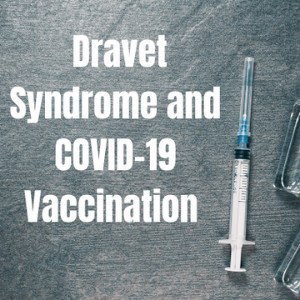As the COVID-19 pandemic continues, vaccination has become a major tool in combating the spread and mitigating the symptomatic infections caused by the novel coronavirus. Vaccination can be a topic of particular concern for individuals with Dravet syndrome (DS) and their families given that vaccines are a common seizure trigger in this disorder. Early childhood vaccination often coincides with the onset of seizures in DS, and about 30% of patients are estimated to have seizures triggered by vaccines at some point in their life 1-6. Vaccination does not cause DS, rather >90% of cases have a mutation in the SCN1A gene7. Rather than the vaccine actually being causal, fever is thought to be the primary trigger of seizures following vaccination, especially given that warm temperatures and fever in general are a common seizure trigger among the population of individuals with DS4,5. Additionally, there may be issues with immune regulation in DS that contribute to seizures following vaccination8, although this needs to be studied further. As the COVID-19 vaccine becomes available to additional age groups, more families will need to make the decision about whether or not to vaccinate their loved one with DS. Given the risk of seizures following vaccination in DS, these decisions can be particularly weighty.
The Dravet Syndrome Foundation partnered with our medical advisory board and Dr. Danielle Andrade’s Adult Epilepsy Genetics Program to develop a survey that would collect information on COVID-19 vaccination and individuals with DS. The survey was distributed from May to August 2021 and received 285 responses. Today’s blog is sharing some of the data collected from this survey in the hopes it may help to inform families making future COVID-19 vaccination decisions.
- Caregivers to 120 individuals living with Dravet syndrome responded that their child/adult had received at least one-dose of a COVID-19 vaccination at the time of the survey.
- 94 had received two doses
- 2 had received a single-dose vaccine
- Vaccinated individuals were between the ages of 11 and 42 years old (average 21 years)
- 24% reported a previous association of seizures following vaccination (non-covid vaccines)
- Vaccines were from the following manufacturers:
- Pfizer/ BioNTech (82.5%)
- Moderna (13%)
- Oxford/ AstraZeneca (2.5%)
- Johnson & Johnson/ Janssen (2%)
Caregivers reported, to the best of their ability, on the presence of side effects following each dose of the vaccine. The survey asked about the presence of fever, increased seizure activity, occurrence of status epilepticus, allergic reaction, lethargy, headache, chills, muscle pain, nausea, and soreness at the injection site. Results are displayed in the chart below, separated by Dose 1 in blue and Dose 2 in magenta.
- No side effects were reported in 55% of individuals after the first dose and 50% of individuals after the second dose.
- The most commonly reported symptoms were lethargy and injection site soreness.
- Increased seizure activity was reported in only 9% (11 out of 120 individuals) following the first vaccine dose and 11% (10 out of 94 individuals) following the second vaccine dose. Five of these 10 patients also had seizures after the first dose.
- Open-ended responses indicated that a few patients required seizure rescue medication (2 patients after the first dose and 1 patient after the second dose).
- No responses indicated status epilepticus following COVID-19 vaccination.
- While incidence of seizures appeared to remain similar between the first and second dose of the vaccine, the reports of fever were higher following the second dose (19% versus 5%).
The majority of side effects were reported to occur between 6 and 24 hours following each dose of the vaccine, although the second vaccine dose appeared to have a slightly earlier and longer presentation of side effects (primarily 0-48 hours). Medications to reduce fever (antipyretics) were used in the hours before the vaccination by 20% of individuals and following vaccination by approximately 60% of individuals. 8-10% of patients were given preventative doses of anti-seizure medication in addition to their normal daily medications (often called “bridge medications”) surrounding each dose of the vaccine.
It was encouraging that the majority (~90%) of individuals were not experiencing increased seizures after a dose of the vaccine, and that no patient went into status epilepticus following either dose of the vaccine. Caregivers should discuss decisions surrounding vaccination for COVID-19 with their child or adult’s health care providers. These discussions should include if and when to use fever or additional seizure prevention medications, as well as to ensure you have an up-to-date Seizure Action Plan including guidelines for how to intervene in a seizure emergency. We are grateful to the families that participated in the survey and shared their information to benefit other families living with DS.
References:
-
Barrera MN, Lillo MM, Collado CR, Fernández-Mensaque RC, Charro AAC. Epilepsia mioclónica severa de la infancia. Estudio epidemiológico análitico. Revista De Neurología. 2000;30:620.
-
Berkovic SF, Harkin L, McMahon JM, et al. De-novo mutations of the sodium channel gene SCN1A in alleged vaccine encephalopathy: a retrospective study. Lancet Neurology. 2006;5:488–492.
-
Caraballo RH, Fejerman N. Dravet syndrome: A study of 53 patients. Epilepsy Research. 2006;70:231–238.
-
McIntosh AM, McMahon J, Dibbens LM, et al. Effects of vaccination on onset and outcome of Dravet syndrome: a retrospective study. Lancet Neurology. 2010;9:592–598.
-
Tro‐Baumann B, Spiczak S von, Lotte J, et al. A retrospective study of the relation between vaccination and occurrence of seizures in Dravet syndrome. Epilepsia. 2011;52:175–178.
-
Wong PTY, Wong VC-N. Prevalence and Characteristics of Vaccination Triggered Seizures in Dravet Syndrome in Hong Kong: A Retrospective Study. Pediatric Neurology. 2016;58:41–47.
-
Li W, Schneider AL, Scheffer IE. Defining Dravet syndrome: An essential pre‐requisite for precision medicine trials. Epilepsia. Epub 2021.
-
Auvin S, Jeljeli M, Desnous B, Soussi‐Yanicostas N, Dournaud P, Sterkers G. Altered vaccine‐induced immunity in children with Dravet syndrome. Epilepsia. 2018;59:e45–e50.






